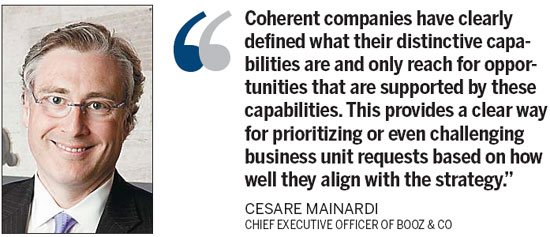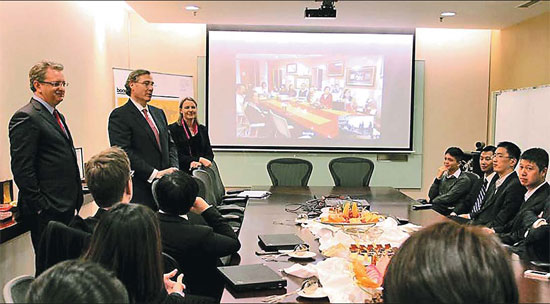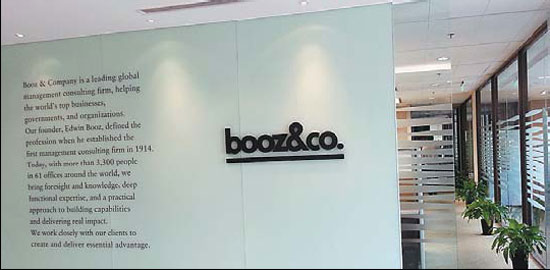Making capabilities count
Updated: 2013-01-17 07:28
By He Wei in Shanghai (China Daily)
|
||||||||
|
Cesare Mainardi, chief executive officer of Booz & Co, and other top directors meet consultants in Shanghai in June 2012. Provided to China Daily |
Knowing what to cut and what to keep is key rule for companies
The second half of 2008 meant a lot to Cesare Mainardi, chief executive officer of Booz & Co.
In the summer, the management consultancy - then known as Booz Allen Hamilton - separated from its US government consulting business to launch in its present form. Major world economies were being hit by global financial disarray. It was then that Mainardi, then managing director of Booz's North American business, made his first trip to the Chinese mainland.
That was the week, Mainardi recalled, when Lehman Brothers filed for bankruptcy.
Yet he didn't notice any differences when he landed in Shanghai, the country's most dynamic economic hub.
"China serves the world as an exporting giant. When you think of China's growth over time, it's going to be the world's largest consumption market for goods," he said.
According to a Forbes report in 2011, Booz ranks among the top five consulting firms worldwide, citing US-based career website Vault.com.
That's remarkable given the fact that one would be hard-pressed to find a worse time than 2008 to launch a global consulting business focused on commercial clients, many of whom did not survive the recession that began within a few short months.
But Mainardi believes the financial crisis had a silver lining - it forced companies to become more focused, disciplined and coherent in order to survive and, ultimately, win in their industries.
And Mainardi said research has proved that the surest way to achieve this coherence is by applying the approach he helped to pioneer, called the "Capabilities-Driven Strategy".
"Coherent companies have clearly defined what their distinctive capabilities are and only reach for opportunities that are supported by these capabilities. This provides a clear way for prioritizing or even challenging business unit requests based on how well they align with the strategy," he explained.
Capabilities focused
In the case of Booz, it followed this formula for success. The former combined Booz Allen Hamilton served both government and commercial clients, which required very different sets of capabilities. The government business was based on huge programs staffed by hundreds of individuals for years at a time, whereas commercial consulting relied on smaller teams focused on high-priority strategic issues delivering rapid impact.
Therefore, it made perfect sense for Booz to separate from Booz Allen Hamilton in 2008 and choose to focus on commercial business. It is further differentiating itself today as The Capabilities Firm, committed to helping its clients identify and build the distinctive capabilities they need to outperform. It acquired Katzenbach Partners in 2009 to enhance its ability to execute that strategy.
Building on that differentiation, Booz has managed to weather perhaps the most severe economic downturn since the 1930s. When officially taking the global helm of the company in April 2012, Mainardi was proud to deliver robust financial results of 10 percent year-on-year growth.
In emerging markets such as China, revenue vastly expanded at 30 percent last year. Business in the mature US market grew at a healthy 20 percent. Even crisis-hit Europe saw a 5 percent surge last year, with some key countries expected to show greater signs of growth soon.
Mainardi is one of the principal architects of the capabilities-driven approach, which is deemed the winning formula not only for Booz but also for the many clients that turn to it for advice.
To grasp the essential advantage, as Mainardi said in a co-authored book in 2010, companies should know what to cut and what to keep.
According to Mainardi, many companies believe their only chance to beat competition is to reduce prices. They rely too much on benchmarking and imitate what others do.
However, they should really edge out rivals - not by copying them - but by applying their own well-defined set of distinctive capabilities to offer something different to the market, add new value, and break out of the pack.
He referred to the case of retail giant Walmart. "Walmart is simply amazing at sharp-penciled supply chain management. No retailer does it better. They've gotten maximum efficiency from their supply chain by integrating four capabilities - aggressive vendor management, expert point-of-sale data analytics, superior logistics and rigorous working-capital management. Together this delivers the 'everyday low prices' they are known for and allows them to lead the market. This is a winning capabilities system," Mainardi explained.
The same principle applies to other successful merchants - each leverages a distinctive set of core capabilities. Apple is good at bringing appealing, intuitive, ergonomic design to a variety of consumer markets. Zara boasts a flexible supply chain that allows it to follow fashions on a weekly basis without resorting to heavy discounts to unload inventory that is no longer in vogue.
Mainardi said the concept he built was largely attributable to his background as an engineer, which gave him a disciplined thinking of the world that he brought to his consulting work.
His knowledge of engineering helped him deal with manufacturing clients during his early years on the job. But, later on, it brought systemic thinking to developing strategies for clients across industries.
"I believe individuals with almost any background can thrive in consulting, not just engineers. It's all about having a passion to serve clients, generating high-impact ideas and possessing the ability to help clients drive change," he said.
Nowadays, consulting is no longer just about smart people getting on planes to visit companies. The real magic of consulting is weaving together all kinds of different consultants with many different skill sets into a high-performing team that can truly deliver the specific change each client requires.
"This has been the most amazing career I can imagine," he said. It is what has kept Mainardi with Booz for 26 years.
Chinese clients
While admitting that he is not an old China hand, Mainardi said his company saw a rapid surge in its Chinese business. The number of clients Booz serves in China is "a healthy mix".
"We don't believe the right answer in China is to work with multinational companies alone. The right answer is to also serve local businesses," the senior consulting sector practitioner said.
Mainardi has noticed a paradigm shift in the market. During the first phase, as Mainardi called it, the "China for the rest of the world" stage, everybody had a key interest in the country so that many foreign players were seeking advice on how to operate in China.
A few years later, there was the emergence of Chinese companies that were looking for advice on the professionalization of management.
Now, consulting in China has evolved rapidly from advising companies on how to run businesses in China and exchange best practices into how to build winning institutions on a regional or global basis, whether it is a Chinese or foreign company. Especially after the global financial crisis, performance consciousness in China is increasing. Chinese companies, like their foreign peers, have grown far more sophisticated.
They are fed up with simply receiving advice, market studies or ad hoc projects. Because of the global financial crisis, the market now demands actual outcomes, results, and enduring capabilities.
So the function of the industry has transformed from giving general advice toward providing specific expertise to make a measurable difference.
For instance, Booz helped Hengan International Group Co Ltd, a leading manufacturer of personal hygiene products, enhance its operational flow, performance assessment mechanisms and corporate structure in 2009.
Looking to the future, Mainardi said that it is not easy to compete in an environment where top-tier strategy firms, such as McKinsey & Co, Bain & Co and Roland Berger, have a high-profile presence.
"They are all great firms in our peer set. But we want to stand out as a firm that's different in terms of who we are. We've always been the practical strategists by informing strategy through a capabilities lens. It's an unmet need in the market and we're poised to fill it," Mainardi said.
hewei@chinadaily.com.cn
|
The entrance to Booz & Co's Shanghai office, which is also its headquarters in China. Provided to China Daily |

(China Daily 01/17/2013 page15)

 In Photos: 7.0-magnitude quake hits Sichuan
In Photos: 7.0-magnitude quake hits Sichuan
 Li Na on Time cover, makes influential 100 list
Li Na on Time cover, makes influential 100 list
 FBI releases photos of 2 Boston bombings suspects
FBI releases photos of 2 Boston bombings suspects
 World's wackiest hairstyles
World's wackiest hairstyles
 Sandstorms strike Northwest China
Sandstorms strike Northwest China
 Never-seen photos of Madonna on display
Never-seen photos of Madonna on display
 H7N9 outbreak linked to waterfowl migration
H7N9 outbreak linked to waterfowl migration
 Dozens feared dead in Texas plant blast
Dozens feared dead in Texas plant blast
Most Viewed
Editor's Picks

|

|

|

|

|

|
Today's Top News
Live report: 7.0-magnitude quake hits Sichuan, heavy casualties feared
Boston suspect cornered on boat
Cross-talk artist helps to spread the word
'Green' awareness levels drop in Beijing
Palace Museum spruces up
First couple on Time's list of most influential
H7N9 flu transmission studied
Trading channels 'need to broaden'
US Weekly

|

|









